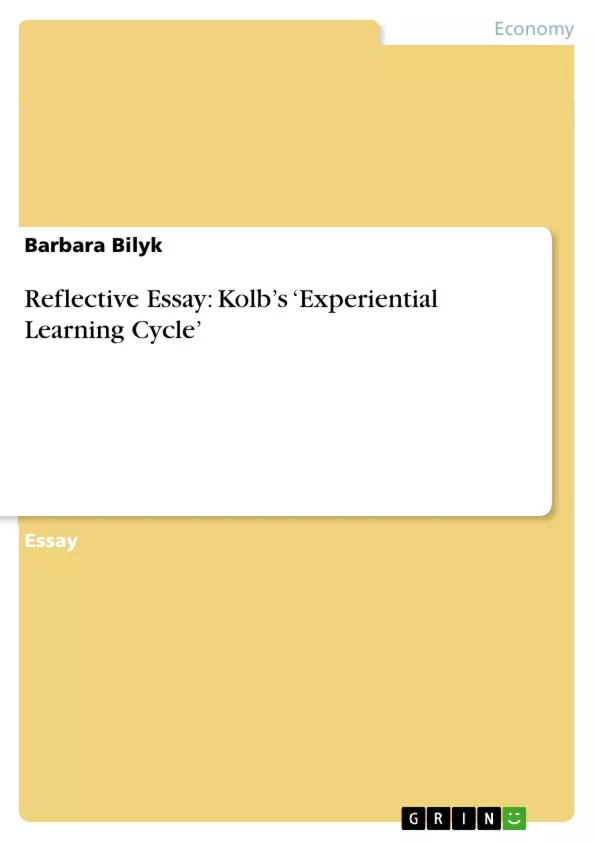Experiential education describes a didactic model which is based on the assumption that only a direct and practical examination of the learning content allows for a effective and meaningful learning. In this concept the learner takes the centre stage. David Kolb’s ‘Experiential Learning Cycle’ is a concept within this approach which describes the ideal relation between experience and future action. According to this model learning is a circular process with the subsequent elements: concrete experience, reflective observation, abstract conceptualisation and active experimentation.
This essay is aimed at reflecting my personal process of learning, acquisition of skills and career development in a specific learning situation that I experienced throughout the unit ‘Human Resource Development’ (HRD) during Semester 2, 2009 at Swinburne University of Technology. It follows the elements of the Experiental Learning Cycle in order to evaluate my ideas and learn about further actions.
Table of Contents
- Concrete Experience
- Reflective Observation
- Abstract Conceptualisation
Objectives and Key Themes
This essay aims to reflect on the author's personal learning process, skill acquisition, and career development within a specific learning situation: the "Human Resource Development" unit. It uses Kolb's Experiential Learning Cycle to evaluate experiences and plan future actions. The essay focuses on a meeting with a partner to plan a facilitation session.
- Experiential learning and Kolb's learning cycle
- Cross-cultural communication and its impact on teamwork
- The influence of cultural context on communication styles
- Individualistic vs. collectivistic cultural orientations
- The concept of culture shock and its stages
Chapter Summaries
Concrete Experience: The essay begins by describing a meeting between the author and her partner, Andrew, to plan a facilitation session. The initial interaction is marked by awkwardness, a language barrier (the author is German, Andrew is Australian), and differing approaches to decision-making. The author's preference for direct communication contrasts with Andrew's more indirect style. Time constraints add to the tension, resulting in a rushed and somewhat disjointed planning session. The author notes feeling cold, and her body language possibly contributed to the overall awkwardness. They ultimately decide on the "Behavioral Interview" topic.
Reflective Observation: This section reflects on the meeting, highlighting the author's realization of the impact of her own behavior. She acknowledges her body language (folded arms, no laptop) may have conveyed disinterest or unease. The language barrier is identified as a significant obstacle to effective communication and feedback. Differences in decision-making styles are also analyzed, questioning whether the author's direct approach to decision-making was too abrupt. The lack of prior communication about time constraints is noted as a factor contributing to the rushed ending. The author recognizes a lack of anticipation for cultural differences between German and Australian cultures as an underlying issue.
Abstract Conceptualisation: This section explores theoretical concepts to understand the concrete experience and reflective observations. Hall's high- and low-context communication model is applied, positioning the author as a low-context communicator and Andrew as potentially exhibiting characteristics of both. Hofstede's cultural dimensions, particularly individualism/collectivism, are used to analyze the interaction, supporting the observation that both individuals operate within individualistic cultural frameworks. The concept of culture shock and its phases are introduced to explain some aspects of the interaction.
Keywords
Experiential learning, Kolb's learning cycle, cross-cultural communication, high-context vs. low-context communication, individualism vs. collectivism, culture shock, communication styles, teamwork, decision-making, cultural differences, language barriers.
Frequently Asked Questions: A Reflection on Experiential Learning and Cross-Cultural Communication
What is the main focus of this essay?
This essay reflects on the author's personal learning process, skill acquisition, and career development within a "Human Resource Development" unit, using Kolb's Experiential Learning Cycle. It specifically analyzes a meeting with a partner to plan a facilitation session, highlighting challenges related to cross-cultural communication and differing communication styles.
What learning framework is used in this analysis?
Kolb's Experiential Learning Cycle is the central framework, guiding the reflection through the stages of Concrete Experience, Reflective Observation, and Abstract Conceptualization.
What specific experience is analyzed?
The essay focuses on a meeting between the author (German) and her Australian partner, Andrew, to plan a facilitation session on "Behavioral Interview." The meeting was characterized by awkwardness, a language barrier, and differing approaches to decision-making.
What were the key challenges encountered during the meeting?
Challenges included a language barrier, differing communication styles (direct vs. indirect), contrasting approaches to decision-making, and a lack of prior communication regarding time constraints. The author also notes the impact of her own body language on the interaction.
How are cross-cultural communication theories applied?
Hall's high- and low-context communication model is used to analyze the communication styles of the author and Andrew. Hofstede's cultural dimensions, particularly individualism/collectivism, are also applied to understand the interaction. The concept of culture shock is introduced to explain some aspects of the experience.
What communication styles are discussed?
The essay contrasts direct and indirect communication styles, highlighting how these differences influenced the interaction. The author identifies herself as a low-context communicator, while Andrew's style is considered potentially a blend of high- and low-context communication.
What are the key cultural dimensions considered?
The essay examines the impact of individualistic vs. collectivistic cultural orientations on the interaction, noting that both individuals operate within individualistic cultural frameworks.
What are the key takeaways or conclusions of the essay?
The essay concludes by integrating the concrete experience with theoretical concepts to improve future interactions. It underscores the importance of anticipating and acknowledging cultural differences, the impact of body language, and the need for clear communication and planning.
What are the key words associated with this essay?
Experiential learning, Kolb's learning cycle, cross-cultural communication, high-context vs. low-context communication, individualism vs. collectivism, culture shock, communication styles, teamwork, decision-making, cultural differences, language barriers.
What are the stages of Kolb's Experiential Learning Cycle discussed in this essay?
The essay covers the Concrete Experience (the meeting itself), Reflective Observation (reflection on the meeting), and Abstract Conceptualization (applying theoretical frameworks to understand the experience).
- Citar trabajo
- Barbara Bilyk (Autor), 2009, Reflective Essay: Kolb’s ‘Experiential Learning Cycle’ , Múnich, GRIN Verlag, https://www.grin.com/document/146300



